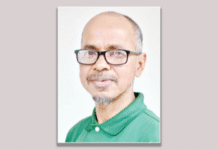She died almost invisibly fading away at a time when so many other news items crowded the scene. Even national media always up for news found little to say about the self effacing politician with commitment to party and her ideals. Zohra Tajuddin passed away at a time when there are few who care to remember or recognise her contribution to the struggle for Bangladesh. She was a loyal comrade of her husband late Tajuddin Ahmed, the Prime Minister of the Mujibnagar government of 1971 which steered the national ship home. But in history she will also have been remembered as a member of the small group of activists who kept the iron of nationalism hot, lived a life without any stain of corruption and raised children who are compared to most politicians of this generation known to be clean and committed. She had achieved everything that could be achieved and we say goodbye to one of the most splendid daughters of Bangladesh ever.
* * *
Dying after hurting herself after a fall at the age of 81 years, she lived through all the ages that the nationalist movement went through. It was a matter of great luck that she was an active participant of the pre 1971 generation, which had such sterling reputation unstained by accusations of corruption and power hungry acts. If she was active in building the party leading to its success in the 1970 elections and the war of independence, it’s also a matter of record that she with a handful of people revived the AL when nobody was around after 1975. This was her greatest hour, when against all odds, she kept the party along with a small band of loyalists alive and going. Even when the AL split into two factions — the pro-BKSAL or one-party rule group and the old Awami League group in the following years, she knew where she stood and in the end the BKSALITES returned to the AL. This was indeed her finest contribution to party politics in the country and the AL should be eternally gratefully to her and a few others for saving the party. But that loyalty was always a bit missing.
* * *
Part of the reason for that was of course the conflict between Tajuddin Ahmed and Sheikh Mujib over political and organisational issues. Sheikh Mujib, as some state was never comfortable with Tajuddin Ahmed’s leadership of the war when he was away in jail in Pakistan. Obviously, he had emerged from a typical bespectacled party functionary to an international leader and there were many who happily poisoned the ears of Mujib against him. In fact this conflict began in 1971 itself when people very close to Sheikh Muijb tried to halt the declaration of the Mujibnagar PM in April. However, the Indian government would have none of it and went ahead and broadcast the speech in defiance of whatever was being told to them. This resentment stayed on and contributed a great deal to the enthusiasm of the Bangladeshi leaders for the Mujib Bahini as a separate event run directly by the Indian army. This conflict within the AL continued and later Tajuddin Ahmed was removed from the cabinet and although they didn’t become adversaries ever, the closest lieutenant of Sheikh Mujib was replaced by Sheikh Moni in 1973.
* * *
While interviewing President Abu Sayeed Chowdhury on his role in 1971, we would often chat about other issues including his acceptance of a ministry after being a President. He said, “Sk. Mujijb sat here where you are sitting and told me it was for the good of the people. We argued for almost half an hour and then he said, I never request anyone to become a minister but I am doing this to you. It’s up to you to accept or decline. What do you think I could do?”
He also said something about Tajuddin Ahmed which I remember shook me up. “Tajuddin Ahmed came to see me one evening and was very agitated. He told me, “Sir, only you can stop him from declaring one party rule BKSAL. If it goes through it will mean the death of all of us. Please stop him.”
Sheikh Mujib was not stopped and his words not literal were proven prophetic in the worst possible way.
It’s only his family members who can say what Tajuddin Ahmed thought of BKSAL if he talked to them about it.
* * *
Zohra Tajuddin didn’t breakdown after her husband was killed inside the jail but went on battling. She took on the leadership after the turmoil and ensured a situation in which Sheikh Hasina could return. For that she and her party members should be grateful to Zohra Tajuddin.
Born on December 24, 1932 in Dhaka, she was married to Tajuddin Ahmed in 1959 and was active in all the AL led movements. She was the AL convener in 1977 and a presidium member in the last three committees of the Party. These hardly do justice to her political role and life and it’s her courage, sacrifice and commitment that makes her one of the greatest Bangladeshis ever even if she never spoke loudly and let her actions do the talking.
On behalf of all who respect the values you symbolised, we salute you.
—————————————–
Afsan Chowdhury is a journalist, activist and writer.
Source: bdnews24










